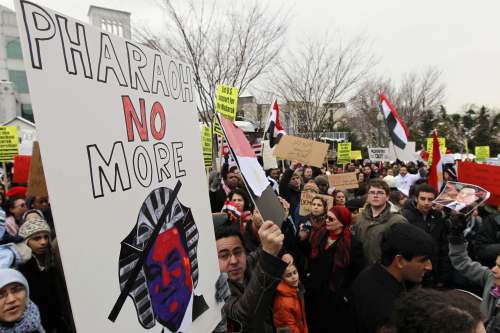WASHINGTON (AP) ― President Barack Obama tried to win over Egyptians enraged by their autocratic ruler and assure an essential ally that the U.S. stood by it.
His four-minute speech from the White House on Friday evening was a balancing act. He had much to lose in the chaos engulfing Egypt, where protesters are demanding that Egyptian President Hosni Mubarak step down from a government violently clinging to its three-decade grip on power.
“The United States will continue to stand up for the rights of the Egyptian people and work with their government in pursuit of a future that is more just, more free and more hopeful,” Obama said.
He gave no ultimatum, made no specific demand. Mubarak, he said, had a “responsibility to give meaning” to his pledges of better democracy and more economic opportunity.
 |
Demonstrators fill the street in front of the Egyptian embassy in Washington Saturday, demanding that Egyptian President Hosni Mubarak step down. (AP-Yonhap News) |
The U.S. response is challenged by a massive mismatch in the perception and reality of its power. Despite spending billions in Egypt to establish a bulwark of American influence in the Middle East, the U.S. has little capacity to determine whether the 82-year-old Mubarak weathers the protests or is toppled, analysts and past administration officials say.
Mubarak sacked his Cabinet and promised reforms to try to quell the protests. He defended the crackdown, in which at least 62 people have died.
After Mubarak’s televised appearance on Friday, Obama spoke from the White House. He didn’t endorse a new Egyptian rule. Nor did he say Mubarak’s announcement was insufficient. Rather, he said he told Mubarak to take “concrete steps” to expand rights.
Should Mubarak step down? Announce that he won’t run again? Time to scrap emergency laws in place since 1981?
Administration officials wouldn’t say.
“The Egyptian government can’t reshuffle the deck and then stand pat,” State Department spokesman P.J. Crowley said Saturday, adding that Mubarak’s “words pledging reform must be followed by action.”
Was it a start when Mubarak named a vice president for the first time since coming to power nearly 30 years ago? There was no immediate word from Washington.
The U.S. can do little to control or direct the anger in the Arab world unleashed two weeks ago when Tunisia drove out its longtime ruler. Yet the U.S. can do severe harm to its own interests by coming out too forcefully for or against the uprising.
Washington’s perceived ability to pick and choose governments is limited to a very few places. It does not wield that power in the Middle East, where Islamic parties completely opposed to the United States are often the most likely democratic alternatives. That doesn’t mean it won’t try.
The White House is reviewing the $1.5 billion in annual aid to Egypt, an unsubtle warning that it still has some pull with Cairo.
The State Department issued an unusual warning to Americans to avoid all but essential travel to Egypt at the height of the winter tourism season.
After spending billions backing its few Arab friends, the U.S. has damaged credibility in the Arab world, leaving a narrow space for Washington policymakers.
Without a bold statement of solidarity, it’s tough to see how the United States will gain the sympathy of Egyptian protesters fighting a security apparatus that has worked closely with American counterparts and may be using U.S. equipment to repress them.
Obama aimed high: “The people of Egypt have rights that are universal. That includes the right to peaceful assembly and association, the right to free speech and the ability to determine their own destiny. These are human rights and the United States will stand up for them everywhere.”
But he tempered the bold idealism of a world of universal rights with a strong plea for peaceful protests. He was clear that Mubarak’s government still had some U.S. support. “We are committed to working with the Egyptian government and the Egyptian people,” Obama said.
The need for balance is obvious. Completely alienating Mubarak would be a disaster for the U.S. if his government weathers the storm, possibly harming cooperation in the Mideast peace process or on counterterrorism.








